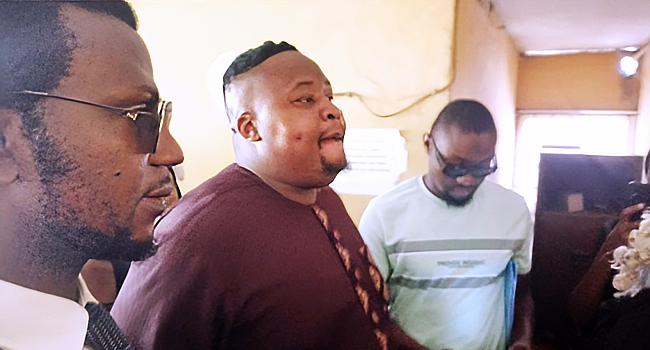In Port-au-Prince you cannot see the boundaries, but you must know where they are. Your life may depend on it. Competing gangs are carving up the Haitian capital, kidnapping, raping, and killing at will. They demarcate their territory in blood. Cross from one gang’s turf to another, and you may not make it back.
Those who live here carry a mental map, dividing this teeming city into green, yellow, and red zones. Green means gang free, yellow can be safe today and deadly tomorrow, and red is a no-go area. The green area is shrinking as heavily armed gangs tighten their grip.
Armed groups control – and terrorise – at least 60% of the capital and its surroundings, according to Haitian human rights groups. They encircle the city, controlling roads in and out. And the UN says the gangs killed almost 1,000 people here between January and June of this year.
This report contains content which some readers may find upsetting, including sexual violence
Port-au-Prince is nestled between green hillsides and the blue waters of the Caribbean. It is blanketed by heat and neglect. The rubbish is knee-deep in places – a putrid monument to a crumbling state. There is no head of state (the last one was killed in office), no functioning parliament (gangs control the area around it) and the US-backed prime minister, Ariel Henry, is unelected and deeply unpopular.
In effect the state is missing in action, as the people suffer overlapping crises. Almost half the population – 4.7 million Haitians – are facing acute hunger. In the capital around 20,000 people are facing famine-like conditions, according to the UN. This is a first for the Americas. Cholera has made a deadly comeback. But armed gangs are the greatest plague.
They set the clock here. Morning rush hour – between 06:00 and 09:00 – is peak kidnapping time. Many are snatched from the streets on their way to work. Others are targeted in the evening rush hour – from 15:00 to 18:00.
About 50 of the staff at our downtown hotel live in because it’s too dangerous for them to go home. Few here go out after dark. The manager says he never leaves the building.
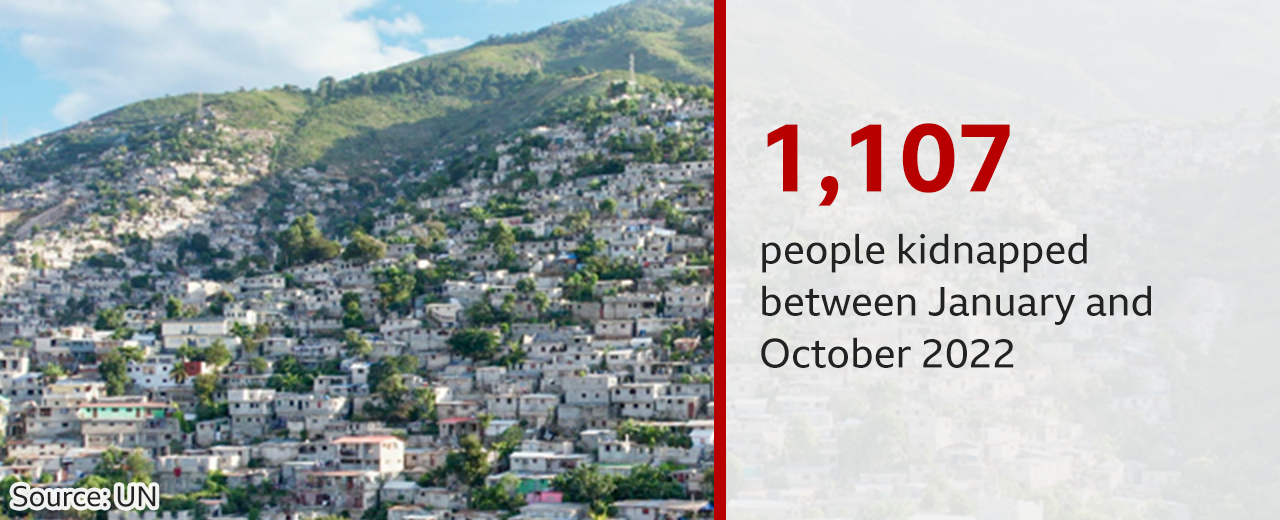
Kidnapping is a growth industry. There were 1,107 reported cases between January and October of this year, according to the UN. For some gangs it’s a major income stream. Ransoms can run from $200 (£164) to $1m (£819,740). Most victims come back alive – if the ransom is paid – but they are made to suffer.
“Men are beaten and burned with materials like melted plastic,” says Gedeon Jean, of Haiti’s Centre for Analysis and Research in Human Rights. “Women and girls are subject to gang rape. This situation spurs relatives to find money to pay the ransom. Sometimes kidnappers call the relatives so they can hear the rape being carried out on the phone.”
Morning in Delmas
We travel around by armoured car. Normally that’s reserved for frontlines in warzones like Ukraine, but it’s necessary in Port-au-Prince to ward off kidnappers. It is a protection that many here can’t afford. It’s the poorest country in the Western hemisphere, prone to both natural and political disasters.
Kidnappers belong to competing gangs – which are mainly grouped into two large coalitions – G9 and G-Pep.
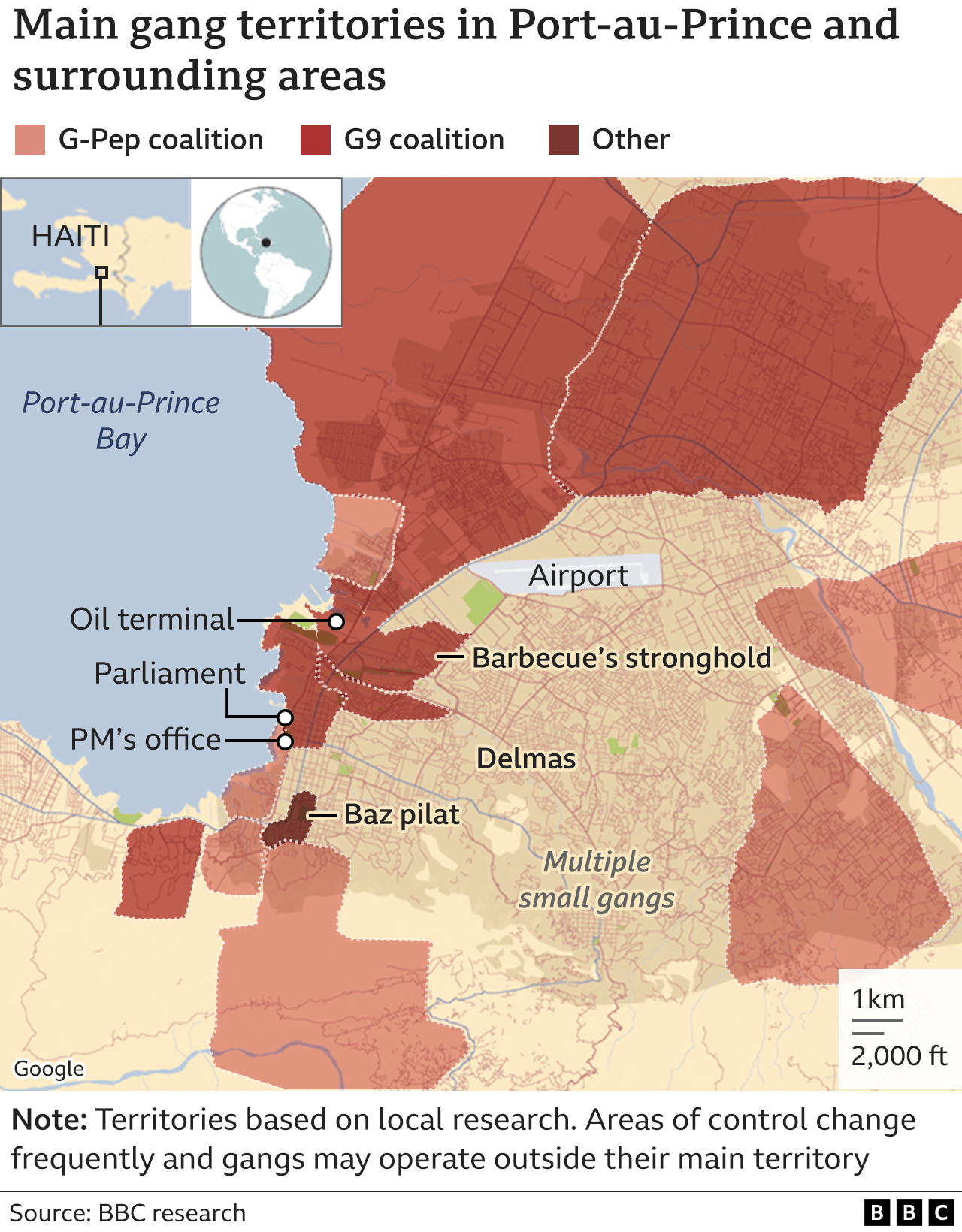
Driving to an early morning appointment in late November, we come across a crime scene in the middle-class suburb of Delmas 83. Bullet casings litter the pavement, glinting in the sunlight, and a man lies dead in a back alley, face down in a pool of blood.
A grey 4×4 pickup truck has veered into a wall, one side riddled with holes. An AK-47 lies on the ground beside it. Heavily armed police surround the pickup, some with faces covered and weapons drawn. Onlookers cluster together on the path. If they have questions, they don’t ask them. When you live in the shadow of the gangs, it pays to be silent.
The police tell us they were involved in a shoot-out with a group of kidnappers, out early hoping to snatch their next victim. The gang fled on foot, one of them trailing blood. The suspected kidnapper was tracked to the alley, where he was killed.
“There was a battle between an officer and the bad guys. One of them died,” says a police veteran of 27 years, who didn’t want to be named.
He says the situation in the capital has never been worse. I asked if the gangs were unstoppable. “We stopped them. Today,” he replies.
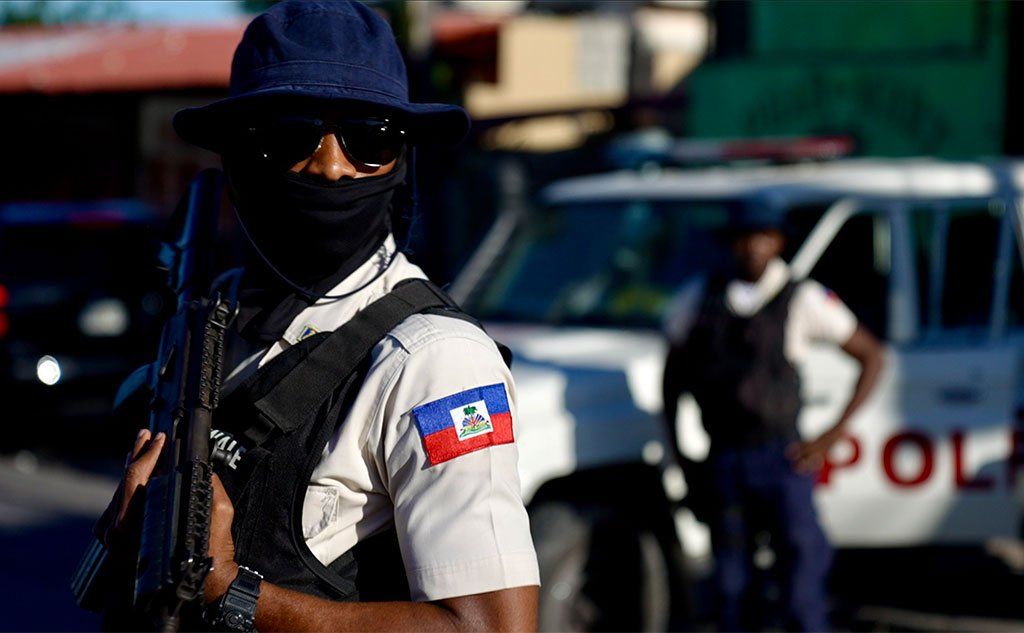
Across town that same morning Francois Sinclair, a 42-year-old businessman, heard a burst of gunfire as he was struck in traffic. He saw armed men holding up the two cars in front of him, so asked his driver to turn around. But as they tried to get away, they were spotted.
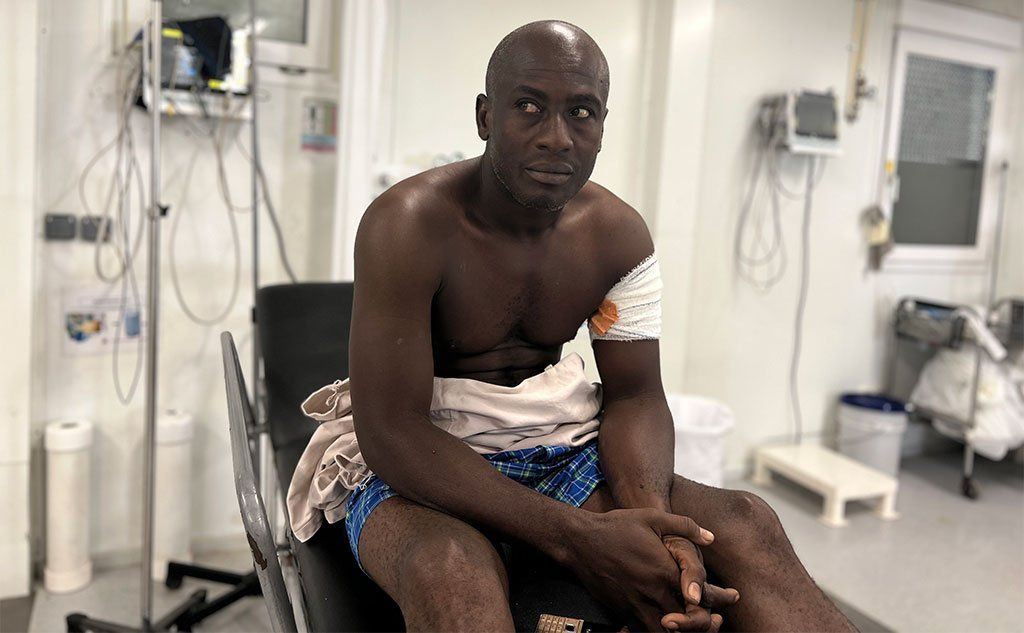
“Out of nowhere I was shot inside my own car, and there was blood everywhere,” he tells us, sitting up on a trolley in a trauma hospital run by Medicins Sans Frontieres (MSF).
“I could have been shot in the head,” he says, “and there were other people in the car too.” There’s a bandage on his arm, where a bullet went straight through.
I ask if he has ever thought about leaving the country to escape the violence. “Ten thousand times,” he replies. “I couldn’t even call my mother to tell her what happened [to me] because she is getting old. The way things are here, it’s better to leave if you can.”
That’s a refrain we hear again and again, but for most Haitians, there’s nowhere to go.
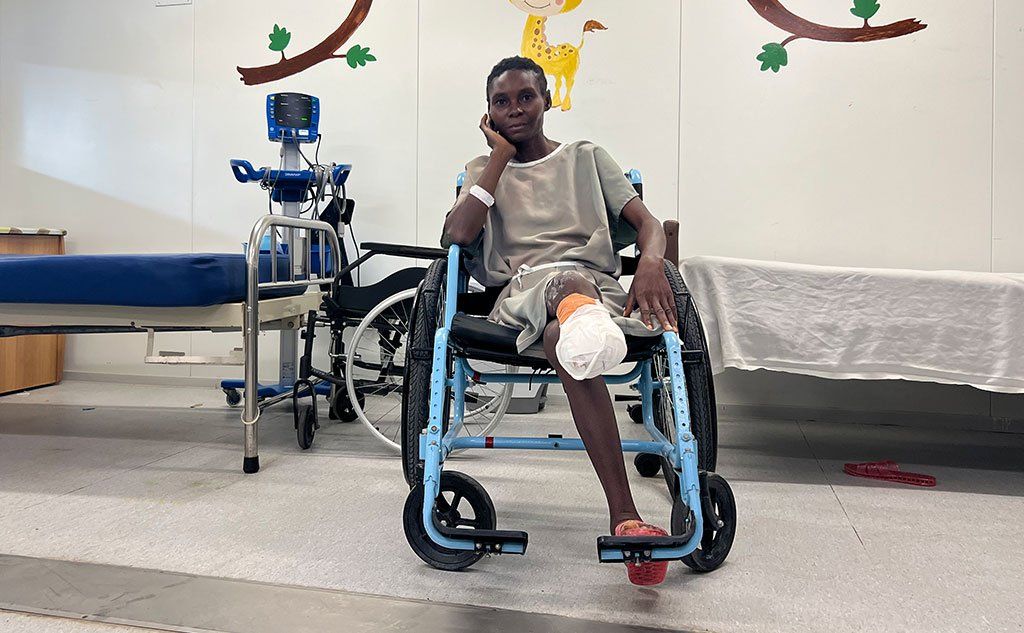
The wards of the MSF hospital are full of gunshot victims, many hit by stray bullets. Claudette, who has a freshly bandaged stump in place of her left leg, tells me that she can never marry now that she is disabled. Lying nearby is 15-year-old Lelianne, who is doing a crossword puzzle to pass the time. She was shot in the stomach.
“My mom and I went out to get something to eat,” she says. “While we were ordering I felt something. That’s when I fell and screamed in agony. I didn’t expect to survive. I usually hear gunshots further away from my house. On that day they drove closer.”
Even Haiti’s last serving president wasn’t safe in his own home. Jovenel Moise was killed by gunmen in July of 2021. Police blamed Colombian mercenaries, about 20 of whom were arrested. But more than a year later, no-one has been tried here for pulling the trigger or ordering the assassination. Human rights campaigners say four judges have come and gone from the case. It’s now in the hands of a fifth.
The killing of the president created a power vacuum which gangs have been competing to fill – with help from their friends.
Experts say that armed groups have ties to corrupt political figures – in power and in the opposition. They supply the gangs with weapons, or finance, or political protection. In return the gangs do their dirty work, generating fear, support, or instability, as required.
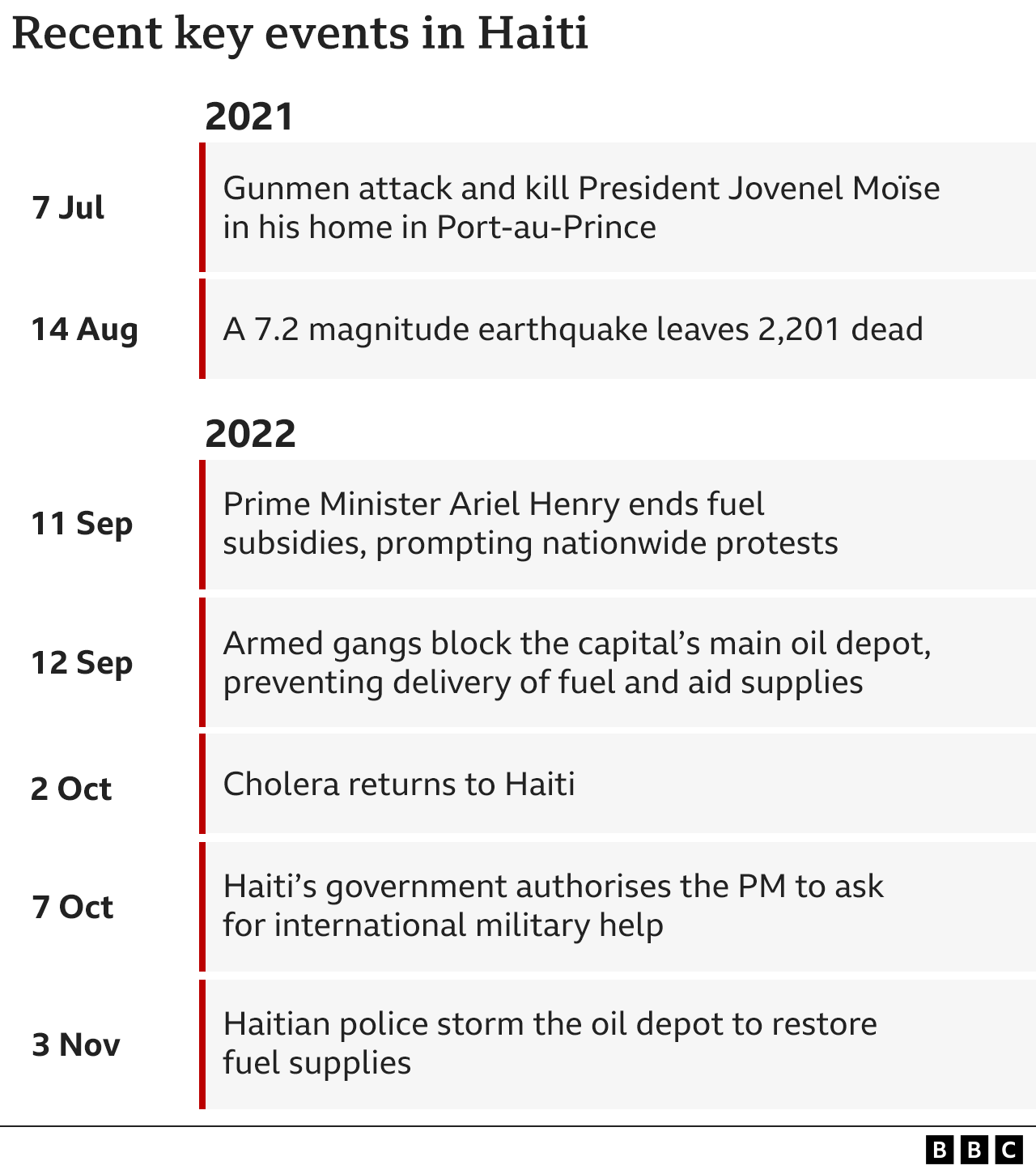

Wealthy businesspeople also have links to the gangs.
“There have always been relationships between politicians and some gangs, located mainly in poor neighbourhoods with high electorates. But since the election in 2011 those relationships have become institutionalised,” says James Boyard, a security expert, and professor of international relations at the State University of Haiti. “They [the gangs] are used as subcontractors to create political violence.”
Rights campaigners say there are about 200 armed groups across the country, more than half of them in the capital.
If a gang member is arrested, a phone call from their backers can get them released without delay – and with their guns. Human rights activists say there’s plenty of crime, but no punishment.
BBC











